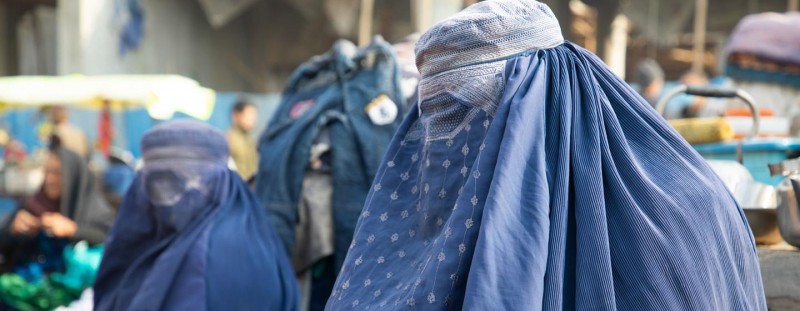Women selling their belongings in a market in Balkh province, Afghanistan. Nasima*, 36, is a peacebuilder and a women’s rights activist in Afghanistan. After the Taliban regained effective control of the country a year ago, she continued to work in Afghanistan, in what would soon become one of the world’s most complex humanitarian emergencies. “I was in my office on 15 August 2021. At 8 a.m., one of my colleagues came in and told me to close the office, and sent all the women home. The Taliban were at the gates of Kabul. I was studying, finalising my master’s degree; I was the leader of a civil society organisation; and I was running two businesses. For the previous 10 months, I had been working on building the biggest network in Afghanistan, that brought women closer to the peace process. Every day, my job was to elevate the voices of Afghan women to the forums where decisions that concerned their future were being made. I was constantly on the ground, travelling from province to province, talking to thousands of Afghan women. At 11 a.m. that day, I locked my office and went home. Walking home, I saw that the roads were blocked with people trying to get out of Afghanistan. At 6.30 p.m., I saw the Taliban passing by my house for the first time. I remembered the last time they ruled as if it were yesterday—my mother had to wear a burqa, my neighbour’s daughter was married at 11-years-old, and my mother would put a big scarf on me every time we would get out of the house. I was eight. Something died inside me on 15 August 2021, or at least that is how I felt: my hopes crushed, my education irrelevant, my investment in Afghanistan gone. A lot of dark nights followed. My projects involving women had to be shut down; most of my women staff resigned. But I knew I had to do something. I realized the Afghanistan the Taliban were ruling now was different from the Afghanistan of the 1990s. This time they came after two decades of democracy, two decades of women’s rights, where women-led organisations were formed, and women became the main advocates for their own rights. I realized not all these women had left the country; not all the educated men had been evacuated. I realized there were still lots of women fighting inside the country. And I chose to be one of them. On 1 September, I was ready to go back to work. I called my staff—women and men—and asked them to come back to the office. I changed the focus of our organization, but I continued to work for women only. A woman walks through a corridor in a village in Zindajan district, Afghanistan. (File) I advocated with the Taliban to ensure the protection of our women staff on the ground. I still faced many issues: the doors of our food distribution centres were closed, my staff was beaten, my laptop was taken, my phone was searched, I was asked to stay silent. But I never gave up. Women would line up at our food distribution centres from 2 a.m. One day, I saw a woman I knew lining up for food. She had a master’s degree and used to work for the Ministry of Culture. Thousands of women used to work for ministries across the country. Now, some of them have to line up for a bag of flour to feed their children. If I reflect over the last year, it is hard to think of anything positive. Women cannot go to work; they have no rights; they cannot even go to school. Violence at home is now normalized and some women are committing suicide—the last resort when their situation becomes unbearable. But I know we are not alone, I know our story is not different—in times of war, in times of peace, women are the ones suffering the most. Afghanistan needs what any other country in the world needs: women to work, to lead, to turn challenges into opportunities. * Names, locations, and course of events have been changed in this article to ensure the safety of the Afghan woman human rights defender featured.Something died inside me on 15 August

‘I never gave up’
UN Women in Afghanistan
The World Organization for Development has been endowed with consultative status with the UN ECOSOC since 2014. The World Organization for Development, which has consultative status wich the UN ECOSOC, develops and implements Global Initiatives to achieve the UN Sustainable Development Goals.




Comments are closed.